|
|
|
Sort Order |
|
|
|
Items / Page
|
|
|
|
|
|
|
| Srl | Item |
| 1 |
ID:
143651
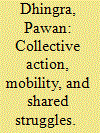

|
|
|
|
|
| Summary/Abstract |
The model minority remains one of the most durable images assigned to immigrant groups despite ample critiques of it. Those persons considered to be a model minority often promulgate the myth themselves. Common arguments against the stereotype do not effectively speak to these people. In this article I demonstrate the disconnect between the critiques of the stereotype and the views of Indian American professionals, a group widely considered to be a model minority. I then offer an alternative approach to dismantling the stereotype that can resonate more with those invested in it. This approach highlights groups’ history of collective action in response to racialised and class obstacles. Three case studies illustrate this approach: study of Indian American motel owners, of physicians, and of taxi drivers. Taxi drivers are thought to be on the opposite end of the model minority binary than doctors and successful motel owners. The case studies highlight the grassroots activism shared by all three groups.
|
|
|
|
|
|
|
|
|
|
|
|
|
|
|
|
| 2 |
ID:
143653
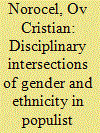

|
|
|
|
|
| Summary/Abstract |
The present study examines how the desirable ideals of femininity for the ethno-nationalist project are framed in populist radical right media in contemporary Romania. The study examines the editorials of populist radical right party leader (Corneliu Vadim Tudor) published at election times between 2000 and 2012 in the weekly party publication. It explores the inventory of media frames, which provide the panopticon of femininity performances coming forth in Tudor’s editorials, and the disciplining endeavours these depictions enable. In the first step, the femininity performance of Romanian women seen as nationalist ideal of submission and childbearing is juxtaposed with the portrayal of women who forsake such expectations, and that of Roma women described as promiscuous and overly fertile. In the second step, the roles afforded to women in the public arena are evidenced, either as selfless heroines or their antithetic depiction, the power-hungry women.
|
|
|
|
|
|
|
|
|
|
|
|
|
|
|
|
| 3 |
ID:
143646


|
|
|
|
|
| Summary/Abstract |
Defining the relationship between displaced populations and the nation state is a fraught historical process. The Partition of India in 1947 provides a compelling example, yet markedly little attention has been paid to the refugee communities produced. Using the case of the displaced ‘Urdu-speaking minority’ in Bangladesh, this article considers what contemporary discourses of identity and integration reveal about the nature and boundaries of the nation state. It reveals that the language of ‘integration’ is embedded in colonial narratives of ‘population’ versus ‘people-nation’ which structure exclusion not only through language and ethnicity, but poverty and social space. It also shows how colonial and postcolonial registers transect and overlap as colonial constructions of ‘modernity’ and ‘progress’ fold into religious discourses of ‘pollution’ and ‘purity’. The voices of minorities navigating claims to belonging through these discourses shed light on a ‘nation-in-formation’: the shifting landscape of national belonging and the complicated accommodations required.
|
|
|
|
|
|
|
|
|
|
|
|
|
|
|
|
| 4 |
ID:
143648
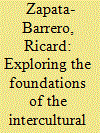

|
|
|
|
|
| Summary/Abstract |
In this second decade of the twenty-first century, interculturalism is emerging as a new policy paradigm to deal with diversity dynamics. It is basically viewed as a set of policies sharing one basic idea: that the interaction among people from different backgrounds matters. Its concerns are to intervene politically and to propose a way to manage the dynamics of diversity, based on exchange and interpersonal relations. I propose exploring a foundational internal debate, based on the premise there are at least three different, but complementary, normative strands: contractual, cohesion and constructivist strands. My ultimate purpose is to defend a comprehensive view, grounded on the argument that no one can have the sole authority to define intercultural policy, since the three strands can be applied at different moments, according to different purposes. The challenge is for policy managers to be able to achieve a balance between the three policy drivers.
|
|
|
|
|
|
|
|
|
|
|
|
|
|
|
|
| 5 |
ID:
143650


|
|
|
|
|
| Summary/Abstract |
By referring to the myth of return, migration literature has focused mainly on sociopolitical explanations, neglecting intersubjective dynamics. This paper operates a switch from myth of return to fantasy. This allows the analysis to be detached from the return speculation’s outcome. It also recognises the cross-generational endurance of return-thinking as functional to the process of identity-building as part of a migrant’s search for well-being. Three British Pakistani migration stories will illustrate how return fantasies are not necessarily a symptom of disengagement with the host society, but are part of a common way human beings have to imagine possible futures for themselves and make sense of their present. Fantasies have the potential to create a virtual transitional space where the individual can re-elaborate experiences in a mode that is safer than the one of reality and may have a positive effect on normalising one’s migration experience.
|
|
|
|
|
|
|
|
|
|
|
|
|
|
|
|
| 6 |
ID:
143649
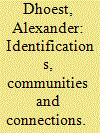

|
|
|
|
|
| Summary/Abstract |
This paper explores sexual and ethnic-cultural identifications among first- and second-generation gay migrants in Belgium. Based on a theoretical framework highlighting the multiple, fluid and intersectional nature of identifications, 29 in-depth interviews are used to study self-identifications and connections to different communities. Drawing on a diverse sample, three clusters of participants can be distinguished: second-generation migrants, who were born in Belgium; sexual refugees, who escaped to Belgium; and voluntary migrants, who chose to move to Belgium. Ethnic-cultural and sexual identifications interact and vary between these groups of participants, but also within them as they intersect with other social positionings such as class, gender and race.
|
|
|
|
|
|
|
|
|
|
|
|
|
|
|
|
| 7 |
ID:
143647
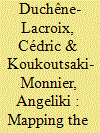

|
|
|
|
|
| Summary/Abstract |
In traditional migration theory, social self-identification is usually linked with the process and quality of integration and with the nationality of the countries of ‘origin’ and of residence. But in the context of a supranational integrated area like the European Union, the self-identification of European people living (also) abroad in another European country can be more complicated. What sorts of identity combinations do they produce in this situation? Could we interpret their choice in the light of their social, economic, cultural capitals and (multi)local integration? Based on an empirical analysis of French citizens in Berlin this article confirms that identity self-combining – not just the identity elements – and the position of the ego in the social space are related. The meaning of the same identity category depends on the respondent’s profiles.
|
|
|
|
|
|
|
|
|
|
|
|
|
|
|
|
| 8 |
ID:
143652


|
|
|
|
|
| Summary/Abstract |
The study explores through a ‘transnational lens’ the Romanian media construction of remitting practices and identities within a wider debate on circular migration. It uses a broad definition of remittances (financial, sociocultural and political) and is concerned with the role of the Romanian press in articulating migrant–non-migrant relationships and laying the ground for informed policy debates. The methodology consists of qualitative corpus analysis and discourse analysis applied to a corpus of 221 news articles. The main findings indicate an overall positive evaluation of remittances (with the main exception of family separation), which endows migrants with social recognition as development agents and is used to justify various policy initiatives, but at the same time disempowers them through instrumentalisation. Even though limited in scope, grassroots migrant–non-migrant interaction, combined with a critical journalistic stance in editorials, opens up an avenue towards negotiation and joint transnational actions.
|
|
|
|
|
|
|
|
|
|
|
|
|
|
|
|
|
|
|
|
|